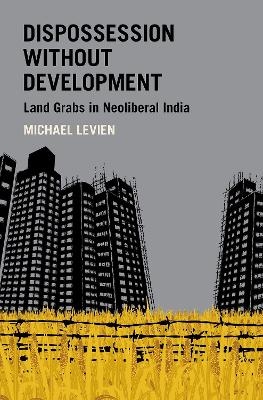
Dispossession without Development
Land Grabs in Neoliberal India
Seiten
2018
Oxford University Press Inc (Verlag)
978-0-19-085916-9 (ISBN)
Oxford University Press Inc (Verlag)
978-0-19-085916-9 (ISBN)
In Dispossession without Development, Michael Levien seeks to uncover the structural underpinnings of India's so-called "land wars." He examines how land dispossession changed with India's shift from state-led development to neoliberalism and the consequences of these changes for dispossessed farmers in contemporary India.
Since the mid-2000s, India has been beset by widespread farmer protests against "land grabs." Dispossession Without Development demonstrates that beneath these conflicts lay a profound transformation in the political economy of land dispossession. While the postcolonial Indian state dispossessed land mostly for public-sector industry and infrastructure, the adoption of neoliberal economic policies in the early 1990s prompted state governments to become land brokers for private real estate capital. This new regime of dispossession culminated with private Special Economic Zones (SEZs) in the mid-2000s. Using the case of a village in Rajasthan that was dispossessed for one of North India's largest SEZs, the book ethnographically illustrates how the zone's real estate-driven and knowledge-intensive growth intersected with pre-existing agrarian inequalities to generate a peculiar and exclusionary trajectory of social change. Taking us into the lives of diverse villagers, the book meticulously documents the destruction of their agricultural livelihoods, the marginalization of their labor, and their exclusion from the zone's "world-class" infrastructure. Most poignantly, it shows farmers' unequal capacities to profit from dramatic land speculation and the consequences of this for village social relations and politics. Illuminating the exclusionary trajectory of capitalism that underlay land conflicts in contemporary India, Dispossession Without Development also advances a novel theory of land dispossession. This book will resonate in both India and many other places where "land grabs" have fueled conflict in recent years.
Since the mid-2000s, India has been beset by widespread farmer protests against "land grabs." Dispossession Without Development demonstrates that beneath these conflicts lay a profound transformation in the political economy of land dispossession. While the postcolonial Indian state dispossessed land mostly for public-sector industry and infrastructure, the adoption of neoliberal economic policies in the early 1990s prompted state governments to become land brokers for private real estate capital. This new regime of dispossession culminated with private Special Economic Zones (SEZs) in the mid-2000s. Using the case of a village in Rajasthan that was dispossessed for one of North India's largest SEZs, the book ethnographically illustrates how the zone's real estate-driven and knowledge-intensive growth intersected with pre-existing agrarian inequalities to generate a peculiar and exclusionary trajectory of social change. Taking us into the lives of diverse villagers, the book meticulously documents the destruction of their agricultural livelihoods, the marginalization of their labor, and their exclusion from the zone's "world-class" infrastructure. Most poignantly, it shows farmers' unequal capacities to profit from dramatic land speculation and the consequences of this for village social relations and politics. Illuminating the exclusionary trajectory of capitalism that underlay land conflicts in contemporary India, Dispossession Without Development also advances a novel theory of land dispossession. This book will resonate in both India and many other places where "land grabs" have fueled conflict in recent years.
Michael Levien is assistant professor of sociology at Johns Hopkins University. He received his PhD in sociology from the University of California, Berkeley in 2013. He has been researching and writing about rural land dispossession in India for the past fifteen years. He lives in Baltimore, Maryland.
Acknowledgements
Map
Personae Dramatis
Preface: From Narmada to Rajpura
1. Introduction
2. Genesis of the Land Broker State
3. Rajpura
4. Dispossession
5. Differentiation by Speculation
6. Peasants in a Knowledge Economy
7. On the Margins of a World City
8. Politics After Dispossession
9. Conclusion: "Land Wars" and Development
Notes
References
| Erscheinungsdatum | 09.05.2018 |
|---|---|
| Reihe/Serie | Modern South Asia |
| Zusatzinfo | 10 line drawings and 8 halftones |
| Verlagsort | New York |
| Sprache | englisch |
| Maße | 157 x 231 mm |
| Gewicht | 499 g |
| Themenwelt | Sozialwissenschaften ► Ethnologie |
| Sozialwissenschaften ► Politik / Verwaltung ► Vergleichende Politikwissenschaften | |
| Sozialwissenschaften ► Soziologie | |
| Wirtschaft ► Betriebswirtschaft / Management ► Rechnungswesen / Bilanzen | |
| Wirtschaft ► Volkswirtschaftslehre | |
| ISBN-10 | 0-19-085916-4 / 0190859164 |
| ISBN-13 | 978-0-19-085916-9 / 9780190859169 |
| Zustand | Neuware |
| Haben Sie eine Frage zum Produkt? |
Mehr entdecken
aus dem Bereich
aus dem Bereich
Geschichte, Parteistruktur, Radikalisierung
Buch | Softcover (2024)
UTB (Verlag)
CHF 38,95


